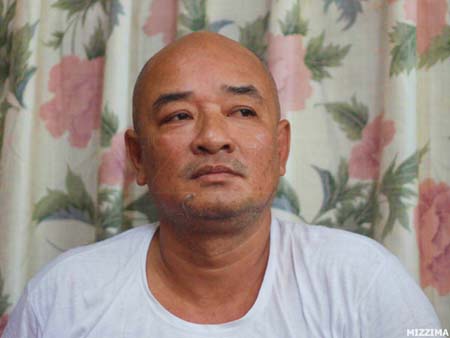New Delhi (Mizzima) – Prominent Burmese comedian Zarganar on Monday, accompanied by comedians Godzilla, Sein Thee and Zee Thee, visited three prisons, donating food, medicine, money and magazines to prison authorities for political prisoners.

The comedian and social rights activist, who was released recently under a presidential amnesty, said the authorities received his donations and cooperated with him.
Zarganar’s donations came through the support of other performers and artists and were earmarked for 34 political prisoners in Thayawaddy Prison, one in Paungde Prison and four in Pyay Prison
“One thing that made me very glad was that the prison authorities heartily welcomed us and received all the donations of food and money [to forward to political prisoners]. Then, they showed me the signatures [of the political prisoners] to prove that they actually received our donations. On behalf of all of us, I would like to give thanks [to the prison authorities],” Zarganar said.
Since Zarganar was released from prison on October 12, it was his first visit to prisons.
Earlier, other artists and groups have sent food and money to political prisoners in Taungoo, Monywa, Loikaw, and Kyaukphyu prison.
Artists who donated gifts included actors Zin Wine, Min Maw Kun; singer Kyapouk (aka) Han Htoo Lwin; actress Tun Eindra Bo; comedians Metta, Kingkong, Ayine, Godzilla, Sein Thee and Pan Thee; and film director Min Htin Ko Ko Gyi.
Earlier, along with 88-generation student Myo Yan Naung Thein, Zarganar traveled to rural areas and met with members of local social networks, farmers, workers, students and National League for Democracy (NLD) members.
His prison tour ends in Pyay. On Monday might, Zarganar and other activists lighted oil lamps and set them adrift on the Irrawaddy River in hope that all political prisoners to be released.
On October 11, the Burmese government announced a presidential amnesty, saying 6,359 prisoners would be released. An earlier amnesty of prisoners was granted in May, and also included some political prisoners.
Estimates say up to 200 political prisoners were released in the second amnesty this year.
Those released include the aged, the sick and the handicapped. There are an estimated 2,000 political prisoners in Burma, say rights’ groups. The government disputes that figure as too high.
The release of political prisoners has been a point of priority for Western governments who have linked economic sanctions to the release of political prisoners and democratic reforms in Burma. The second amnesty is seen as one of several recent steps by the government to move cautiously toward more democracy in the country, which as was ruled by a military junta for decades.
After the prisoner release, Agence France-Presse quoted a top US official, Kurt Campbell, saying that recent governmental developments included a “very consequential dialogue” between opposition leader Aung San Suu Kyi and the Burmese leadership.
Campbell, one of several US officials to meet with Burmese Foreign Minister Wunna Maung Lwin in Washington recently, said, “It is also undeniably the case that there are dramatic developments under way.”
The U.S. government has continued both diplomatic engagement and continued economic sanctions against Burma.
“We have made clear our desire to see continued progress on issues such as prisoner releases,” Campbell, the US Assistant Secretary of State for East Asian and Pacific Affairs, said in Bangkok in early October. He hinted that concrete moves towards democracy by Burma could lead to an easing of sanctions.
“We will match their steps with comparable steps,” he said, according to AFP.



